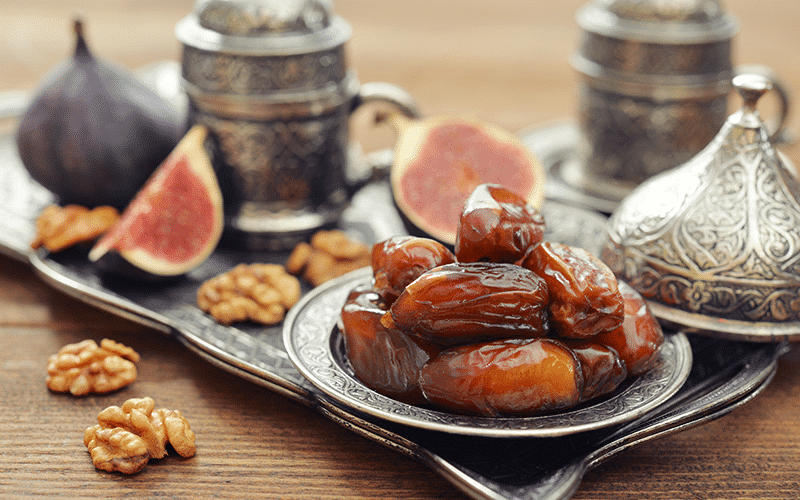One of the most beautiful times of the year is here! And as Muslims all over the world unite for a month-long celebration, there are many who struggle with their fitness goals during this time. The good news is that it IS possible to fast, stay fit and even continue your regular workout during Ramadan.
You don’t have to choose between your physical health & spiritual health. You can take care of both with a few mindful changes in your routine. Here are 1o tips that will ensure the same.
1. Never Skip the Suhoor
Just like breakfast throughout the year, the pre-dawn meal during Ramadan is the most important part of the day. If you’re going to fast till sunset, you need that fuel to get started. Eating a wholesome suhoor would not only prep you for the long day but also ensure that your energy levels do not go too low. Also, it is important that you enjoy this meal instead of rushing through it. So, set up your alarm at least 40-50 minutes before Fajr. This would enable you to wake up on time, prepare the meal, freshen up and eat in peace.
2. Pack Up on Fiber & Protein

As much as it is important to eat suhoor, it is important to eat it right. Even if you don’t feel like it, it is wiser to fill up on high-fiber foods that will help you stay satiated for long hours. Also, the fact that your goal is to maintain your muscle mass, your meals should include protein. Opt for whole grains, fruits, dairy and eggs that play a key role in staving off hunger. Oatmeal topped with fresh fruits & nuts or multigrain sandwiches packed with hummus, greens & tofu are a few amazing options for you to try.
3. Hydrate!

This is extremely crucial if you want to avoid dehydration while you fast. Drink as much fluid as possible during suhoor as well as iftar and the time between these two meals. Plain water is always great but you can make it more interesting with fresh juices, smoothies, protein shakes, plant-based milk, fruit-infused water, soups, coconut water, buttermilk & lime juice. Avoid dehydrating teas, coffees or sugar-loaded aerated drinks and processed beverages. Your body needs more nutritious and natural sources of water when you are fasting. So, make sure you utilize your pre-fast and post-fast time for providing yourself with this hydration.
4. Avoid Physical Exertion During the Day
This goes without saying. You need to keep physical activity to a minimum when you are fasting. Avoid the sun and avoid exhausting yourself with too much moving around. However, that doesn’t mean you should be lazing all day. The idea is to go on with your regular activities and work without putting any extra strain on your body.
5. Take A Power Nap
Sufficient sleep is one of the key foundations for overall wellness. So, if you are trying to stay fit during your fast, it is important to catch up on the lost Zs with a 20-minute power nap during the day. These naps would refresh you, acting as a battery. At the same time, it is important to not confuse these short naps with a long sleep. The latter would only make you more lethargic, preventing you from staying productive through the day.
6. Stay Away from Fried Snacks & Junk Food

One mistake that most Muslims make during Ramadan is developing a fasting and feasting mindset. The goal should not be to eat but to improve your overall well-being and that can only happen with mindful eating. In other words, you need to watch what you eat even during iftar. Fried treats will hamper your digestion and further slow down your metabolism, in turn making you too lazy to even consider working out. Opt for high-quality, whole foods instead. Some of the options to try to include steamed fish, brown rice, boiled chicken, vegetables, lentils, whole-grain bread and lots of fruits. Stay away from empty calories and reach out only for foods that will strengthen you from within.
7. Avoid Overeating

Mindful eating is not just about watching what you eat. It is also about watching how much you eat. It is natural to want to hog at the dinner table after an entire day of fasting but overeating will again lead to lethargy, stomach cramps, and digestive disorders. The best way to go about breaking your fast is to start with water. The fluid will help soothe your empty stomach and prevent acidity. Then, pop a few dates, wait a while and eat your meal with patience, enjoying every bite!
8. Workout Only After Iftar
Now, comes the part of your workout time. This should always be after you have broken your fast and never during the day. Whether you workout at the gym or exercise at home, never do that while fasting. Research shows that even 3% dehydration to the muscles can cause up to 12% muscle damage!
Ideally, you should wait at least 45 minutes after iftar before you start your workout. And don’t forget to keep sipping fluids while you exercise. If you are strength-training your muscles, it is advised to sip lemon water or BCAA supplements during the exercise. This is very helpful in preserving muscle mass.
9. Stick to Low-Intensity Cardio

Keep the cardio exercises low in frequency and intensity during Ramadan. You don’t want to over-exert yourself. Reducing cardio is another trick to prevent muscle loss and 40-70-minutes of cardio per week is sufficient during this month.
10. Take A Walk After Dinner
You need to fuel yourself up after your workout is over. A satiating, wholesome dinner is very important to keep up your fitness levels. The dinner too should be accompanied by healthy fluids like juices or fruits. However, you shouldn’t straight away go to sleep after dining. Make sure you give your body time to digest the meal. Go for a short walk in the park or move around for about 30 minutes after you eat.
There you go. Just follow these tips and you will be able to maintain your fitness while being able to fast during the holy month.
Wishing you a healthy month of fasting. Ramadan Mubarak!

